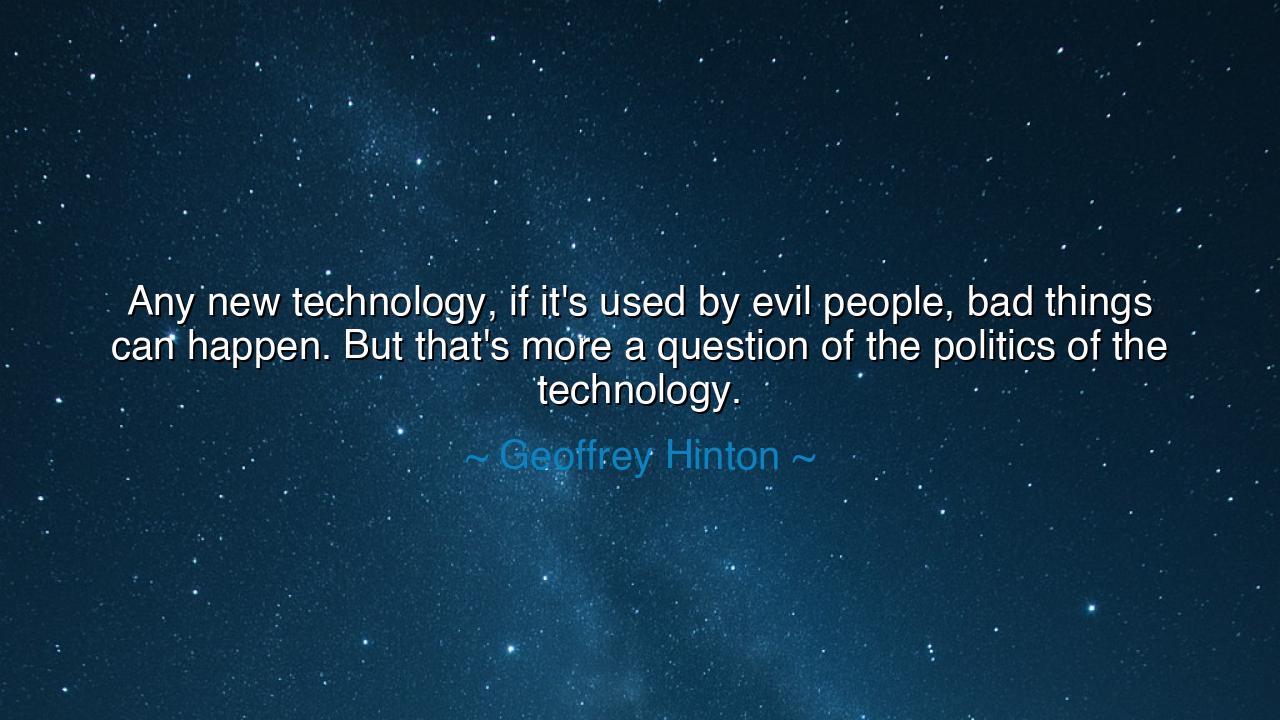
Any new technology, if it's used by evil people, bad things can
Any new technology, if it's used by evil people, bad things can happen. But that's more a question of the politics of the technology.






Hear the words of Geoffrey Hinton, one of the fathers of modern machine intelligence, who declared: “Any new technology, if it’s used by evil people, bad things can happen. But that’s more a question of the politics of the technology.” These words, though forged in the fires of the digital age, carry the cadence of truths as old as the first spark of fire struck from stone. For every tool mankind has ever created—be it fire, metal, gunpowder, or the atom—has held within it both the power to heal and the power to destroy. The tool itself is innocent; it is the spirit of those who wield it that decides its destiny.
The ancients knew this well. Fire warmed the hearth, but it also burned the village. Iron fashioned ploughs to feed the hungry, but also swords to spill blood. The printing press brought knowledge to the multitudes, but also spread lies and division. Thus, when Hinton speaks of the politics of technology, he names not the cold mechanics of invention, but the choices of men and women—their laws, their ethics, their ambitions—that shape whether a tool uplifts or corrupts. Technology is not destiny; it is a mirror of the human soul.
History offers us countless mirrors. When the power of the atom was unlocked in the twentieth century, it promised nearly infinite energy, a clean and potent source of light and warmth. Yet the same discovery birthed weapons that could annihilate cities in a single instant. Hiroshima and Nagasaki stand as eternal reminders that technology itself is not evil, but when placed in the hands of those who choose war, it becomes an instrument of devastation. The danger was not in the atom—it was in the politics of the atom.
So it is in our own time with artificial intelligence, with genetic engineering, with the web of global networks. These marvels hold the promise of healing diseases, ending hunger, and uniting the world. Yet if guided by greed, malice, or tyranny, the same tools can enslave minds, manipulate truths, and deepen divisions. Hinton’s warning is clear: the question is not only what technology can do, but who commands it, and for what purpose.
The deeper meaning of his words is this: evil people will always seek to twist new tools toward harm. This has been true since Cain first lifted a stone against Abel. But the responsibility of the rest of humanity is to shape the politics—the rules, the culture, the values—that ensure the tools of progress serve life rather than death. A knife may cut bread or spill blood, but it is the laws of the community, the training of the hand, and the discipline of the heart that decide which.
The lesson for us, children of tomorrow, is clear: do not fear technology, but do not worship it either. Fear instead the corruption of the human heart, and work to build a society where wisdom, compassion, and justice guide the tools we create. When new inventions arise, do not ask only what they can do—ask who controls them, how they are governed, and whether they serve the many or the few.
Practical actions lie before you: learn about the tools of your age, so you are not blind to their powers. Support leaders and policies that demand ethical uses of technology. Speak against those who would twist innovation into instruments of oppression or violence. And in your own life, wield your tools with integrity, using them to heal, to teach, to build, and to connect. For each small act of responsibility becomes part of the larger shield against misuse.
Thus let Hinton’s words echo as an eternal teaching: “Any new technology, if used by evil people, bad things can happen. But that is more a question of the politics of the technology.” Hear this, and remember: tools are the creations of our hands, but their fate is written by our hearts. If we choose wisely, technology becomes a torch to light the way; if we choose poorly, it becomes a fire to consume us all. The choice, as it has always been, is ours.






AAdministratorAdministrator
Welcome, honored guests. Please leave a comment, we will respond soon